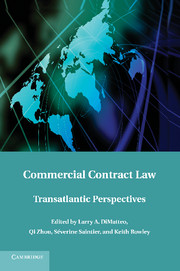Book contents
- Commercial Contract Law
- Commercial Contract Law
- Copyright page
- Dedication
- Brief Contents
- Contents
- Contributors
- Foreword
- Part I The Role of Consent
- Part II Normative Views of Contract
- Part III Contract Design and Good Faith
- Part IV Implied Terms and Interpretation
- 10 Implied Terms in English Contract Law
- 11 Contract Interpretation
- Part V Policing Contracting Behavior
- Part VI Misrepresentation, Breach, and Remedies
- Part VII Harmonizing Contract Law
- Index
11 - Contract Interpretation
Judicial Role Not Parties’ Choice
from Part IV - Implied Terms and Interpretation
Published online by Cambridge University Press: 05 February 2013
- Commercial Contract Law
- Commercial Contract Law
- Copyright page
- Dedication
- Brief Contents
- Contents
- Contributors
- Foreword
- Part I The Role of Consent
- Part II Normative Views of Contract
- Part III Contract Design and Good Faith
- Part IV Implied Terms and Interpretation
- 10 Implied Terms in English Contract Law
- 11 Contract Interpretation
- Part V Policing Contracting Behavior
- Part VI Misrepresentation, Breach, and Remedies
- Part VII Harmonizing Contract Law
- Index
Summary
Employing an economics-based consequentialist approach to contract interpretation (focusing on the prospective effect and the factors that might justify intervention) this chapter attempts to identify the precise parameters of an optimal framework for contract interpretation. Such a framework would seek to maximize gains from trade. The issue in such cases is always, given the words the parties used, what is the best (surplus maximizing) interpretation of the bargain. Courts can achieve that interpretation by, in part, minimizing the interpretive risk that parties face when they draft an express contract but do not completely resolve all possible issues. Contracts often fail to reach the level of particularity needed to resolve a later disputed matter. This chapter uses a framework in which cost considerations predominate to identify realistic models of how parties bargain and plan for disputes in drafting their contracts. The model will use the probabilistic thinking of the parties, with respect to both the meaning of words and the parties’ likely goals for contracting. These goals include the minimization of opportunism and other similar risks that might chill future contracting and the parties’ views on an expected judicial role in interpretation. On the basis of conclusions from these cost-conscious models, this chapter argues for a more expansive interpretive rule than textualism or formalism.
The author argues that the new formalists require the contractin parties to make ex ante choices over factors that they are unlikely to consider at the time of contracting. As a result, formalistic interpretation – the implication that parties prefer the courts to rely solely on the words of the contract – will work to constrain the role of courts severely in contract interpretation. By contrast, purposivism, contextualism, and consequentialism all challenge the idea that words can or should be interpreted without consulting either the overall purpose of the parties, the extrinsic circumstances, or the consequences of adopting a particular interpretation. The explanatory theory offered here is based on minimizing the costs to parties when there is residual uncertainty in a contract. The decision about crafting a particular interpretive rule should depend on which approach best reduces costs and would be most preferred by parties ex ante. The chapter will argue that new formalism decreases surplus by requiring the parties to bargain over a term (whether to allow ex post interpretation) that raises transaction costs in a way that will preclude many bargains.
- Type
- Chapter
- Information
- Commercial Contract LawTransatlantic Perspectives, pp. 240 - 286Publisher: Cambridge University PressPrint publication year: 2013



